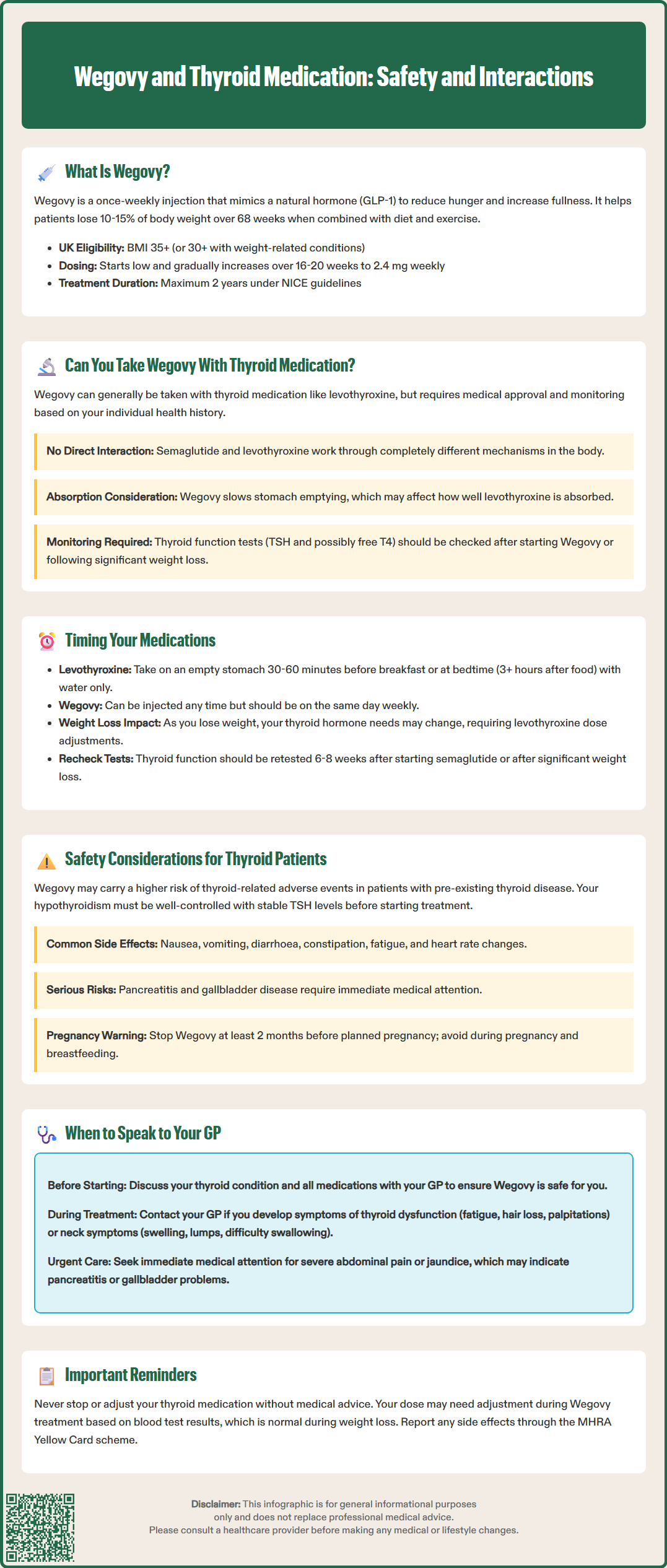
Many patients taking thyroid medication wonder whether they can safely use Wegovy for weight management. Wegovy (semaglutide 2.4 mg) is a GLP-1 receptor agonist licensed in the UK for treating obesity, whilst thyroid medications such as levothyroxine are essential for managing thyroid conditions. In most cases, these treatments can be used together, but careful medical assessment and monitoring are required. This article examines the relationship between Wegovy and thyroid medication, potential interactions, safety considerations, and when to seek medical advice to ensure both treatments work effectively and safely together.
Quick Answer: Wegovy can generally be taken alongside thyroid medication such as levothyroxine, but requires medical assessment and monitoring due to potential effects on medication absorption and thyroid function.

Mounjaro® is the most innovative GLP-1 medication proven to dramatically curb appetite, hunger, and cravings to help professional men achieve substantial weight loss.
Start Here
Wegovy® is a weekly injectable GLP-1 medication with proven effectiveness in reducing appetite, hunger, and cravings to help busy professionals lose significant weight.
Start HereWegovy (semaglutide 2.4 mg) is a prescription medicine licensed in the UK for weight management in adults with obesity or those who are overweight with at least one weight-related health condition. It belongs to a class of medications called glucagon-like peptide-1 (GLP-1) receptor agonists, which were originally developed for type 2 diabetes management.
The medication works by mimicking the action of GLP-1, a naturally occurring hormone in the body that regulates appetite and food intake. Semaglutide binds to GLP-1 receptors in the brain, particularly in areas that control appetite, leading to reduced hunger and increased feelings of fullness after eating. This mechanism helps patients consume fewer calories naturally, supporting gradual and sustained weight loss when combined with a reduced-calorie diet and increased physical activity.
Wegovy is administered as a once-weekly subcutaneous injection using a pre-filled pen device. The treatment begins with a low dose that is gradually increased over 16 to 20 weeks to minimise gastrointestinal side effects and allow the body to adjust. The maintenance dose is 2.4 mg weekly, though a 1.7 mg maintenance dose may be used if the higher dose is not tolerated. Clinical trials have demonstrated that Wegovy can help patients achieve significant weight loss—typically 10-15% of initial body weight over 68 weeks—alongside improvements in cardiovascular risk factors.
In the UK, NICE guidance (TA875) recommends Wegovy only within specialist weight management services for adults with a body mass index (BMI) of 35 kg/m² or above (or lower thresholds for certain ethnic groups), or 30 kg/m² or above with weight-related complications. Treatment is limited to a maximum of 2 years. Important safety considerations include risks of pancreatitis, gallbladder disease, and the need to avoid use during pregnancy and breastfeeding.

Yes, in most cases, Wegovy can be taken alongside thyroid medication, but this requires careful medical assessment and monitoring. Many patients with thyroid conditions, particularly hypothyroidism, struggle with weight management, making weight-loss medications like Wegovy potentially beneficial. However, the decision to combine these treatments must be made by a healthcare professional who understands your complete medical history.
The most commonly prescribed thyroid medication in the UK is levothyroxine , used to treat an underactive thyroid (hypothyroidism). There is no direct pharmacological interaction between semaglutide and levothyroxine that would make their combination unsafe. The medications work through entirely different mechanisms: levothyroxine replaces thyroid hormone, whilst Wegovy acts on GLP-1 receptors to regulate appetite.
However, several important considerations exist. According to the Wegovy SmPC, semaglutide can delay gastric emptying—it slows the movement of food through the stomach, which is part of how it promotes satiety. This delayed gastric emptying could potentially affect the absorption of oral medications, including levothyroxine, which is typically taken on an empty stomach for optimal absorption. For this reason, timing of medication administration becomes particularly important.
Patients taking thyroid medication for hyperthyroidism (overactive thyroid) or those with a history of thyroid disease also need individualised assessment. Your GP or endocrinologist will evaluate whether Wegovy is appropriate based on your thyroid condition, current thyroid function, and overall health status. It's advisable to check thyroid function (TSH and possibly free T4) after starting semaglutide or following significant weight change to determine if levothyroxine dose adjustment is needed. Never start Wegovy without discussing your thyroid medication with your prescribing doctor.
Whilst there is no direct drug-drug interaction between semaglutide and most thyroid medications, several indirect effects warrant attention. The primary concern relates to medication absorption rather than a chemical interaction between the drugs themselves.
Levothyroxine absorption occurs primarily in the small intestine and is sensitive to timing and stomach contents. Because Wegovy slows gastric emptying, there is a possibility that it could alter the rate at which levothyroxine reaches the small intestine. The clinical impact of this effect varies between individuals, and while studies of subcutaneous GLP-1 receptor agonists have generally been reassuring, caution is still advised, particularly as levothyroxine has a narrow therapeutic index.
To minimise any potential absorption issues, patients should follow standard levothyroxine administration guidelines: take it on an empty stomach, typically 30-60 minutes before breakfast or at bedtime (at least 3 hours after food), with water only. Wegovy injections can be administered at any time of day, with or without meals, but should be given consistently on the same day each week.
Another consideration involves thyroid function monitoring. Weight loss itself can affect thyroid hormone requirements in some patients. As body weight decreases, some individuals may need adjustments to their levothyroxine dose. This is not due to an interaction with Wegovy specifically, but rather a consequence of metabolic changes associated with significant weight reduction. Thyroid function tests (TSH, free T4) should be rechecked approximately 6-8 weeks after starting semaglutide or following substantial weight loss to determine if dose adjustments are needed.
For patients taking antithyroid medications such as carbimazole for hyperthyroidism, similar principles apply. There are no known direct interactions, but medical supervision ensures that thyroid function remains stable throughout weight-loss treatment. Any medication that affects gastrointestinal motility should be discussed with your healthcare team to optimise the timing and effectiveness of all treatments.
Patients with thyroid conditions considering Wegovy should be aware of several important safety considerations specific to their situation. Whilst the medication can be used safely in many thyroid patients, certain circumstances require particular caution.
In rodent studies, GLP-1 receptor agonists like semaglutide were associated with thyroid C-cell tumours. While the human relevance of these findings is unknown, patients should be aware that there may be a higher incidence of thyroid-related adverse events in those with pre-existing thyroid disease. Patients should report any new neck swelling, difficulty swallowing, or persistent hoarseness to their GP immediately, as these could indicate thyroid changes requiring investigation.
For patients with hypothyroidism, the main safety consideration involves ensuring thyroid function is adequately controlled before starting weight-loss treatment. Uncontrolled hypothyroidism can cause fatigue, depression, and metabolic changes that may complicate weight management and increase the risk of side effects. Your TSH levels should ideally be within the normal range and stable on levothyroxine before beginning Wegovy.
Patients should be aware of common Wegovy side effects that might be particularly relevant with thyroid conditions:
Gastrointestinal symptoms (nausea, vomiting, diarrhoea, constipation) are very common, especially during dose escalation
Fatigue may occur, which could be confused with thyroid-related tiredness
Heart rate changes have been reported; this is relevant for patients with thyroid-related cardiac effects
Important safety red flags include severe, persistent abdominal pain (with or without vomiting), which could indicate pancreatitis—a rare but serious side effect requiring immediate medical attention. Patients should also be alert to symptoms of gallbladder disease, such as right upper abdominal pain or jaundice.
Regarding pregnancy, Wegovy should be avoided during pregnancy and breastfeeding. Women of childbearing potential should use effective contraception while taking semaglutide and discontinue treatment at least 2 months before a planned pregnancy.
Thyroid function should be monitored based on symptoms and after changes that might affect levothyroxine requirements. Patients are encouraged to report any suspected side effects via the MHRA Yellow Card scheme (yellowcard.mhra.gov.uk).
Before starting Wegovy, it is essential to have a comprehensive discussion with your GP or specialist about your thyroid condition and current medications. This conversation should occur during the initial assessment for weight management treatment, allowing your doctor to evaluate whether Wegovy is appropriate and safe for your individual circumstances.
You should specifically discuss Wegovy with your GP if you:
Are currently taking any thyroid medication, including levothyroxine, liothyronine, or antithyroid drugs
Have a history of thyroid disease or thyroid nodules
Have experienced thyroid function changes in the past with weight fluctuations
Are planning pregnancy (semaglutide should be discontinued at least 2 months before planned conception, and effective contraception should be used while on treatment)
During Wegovy treatment, contact your GP promptly if you experience:
Symptoms suggesting thyroid dysfunction: unexplained fatigue, cold intolerance, hair loss, palpitations, anxiety, or tremor
Neck symptoms: swelling, lumps, difficulty swallowing, or persistent hoarseness
Significant changes in how you feel on your thyroid medication, suggesting your dose may need adjustment
Difficulty tolerating Wegovy side effects, particularly if they interfere with taking your thyroid medication properly
Seek urgent medical attention if you develop:
Severe, persistent abdominal pain (with or without vomiting), which could indicate pancreatitis
Jaundice (yellowing of skin/eyes) or severe right upper abdominal pain, which might suggest gallbladder problems
Your GP may arrange thyroid function blood tests if you develop symptoms or as part of routine monitoring. If your TSH or thyroid hormone levels change significantly, your levothyroxine dose may need adjustment. This is a normal part of managing thyroid conditions during weight loss and does not necessarily indicate a problem with Wegovy.
For complex cases—such as patients with multiple endocrine conditions or difficult-to-control thyroid disease—your GP may refer you to an endocrinologist for specialist assessment before starting or continuing Wegovy. This multidisciplinary approach ensures optimal safety and effectiveness of both your thyroid treatment and weight management plan. Never stop or adjust your thyroid medication without medical advice, even if you experience side effects from Wegovy.
If you suspect you're experiencing side effects from Wegovy, report them via the MHRA Yellow Card scheme (yellowcard.mhra.gov.uk).
Yes, in most cases Wegovy can be taken with levothyroxine, but you must discuss this with your GP first. Your thyroid function should be stable and well-controlled before starting Wegovy, and may need monitoring after significant weight loss.
Wegovy slows gastric emptying, which could potentially affect levothyroxine absorption. Taking levothyroxine on an empty stomach as directed and maintaining consistent timing helps minimise any absorption issues.
Some patients may require levothyroxine dose adjustments during significant weight loss. Your GP should check thyroid function tests approximately 6-8 weeks after starting Wegovy or following substantial weight reduction to determine if changes are needed.
All medical content on this blog is created based on reputable, evidence-based sources and reviewed regularly for accuracy and relevance. While we strive to keep content up to date with the latest research and clinical guidelines, it is intended for general informational purposes only.
DisclaimerThis content is not a substitute for professional medical advice, diagnosis, or treatment. Always consult a qualified healthcare professional with any medical questions or concerns. Use of the information is at your own risk, and we are not responsible for any consequences resulting from its use.